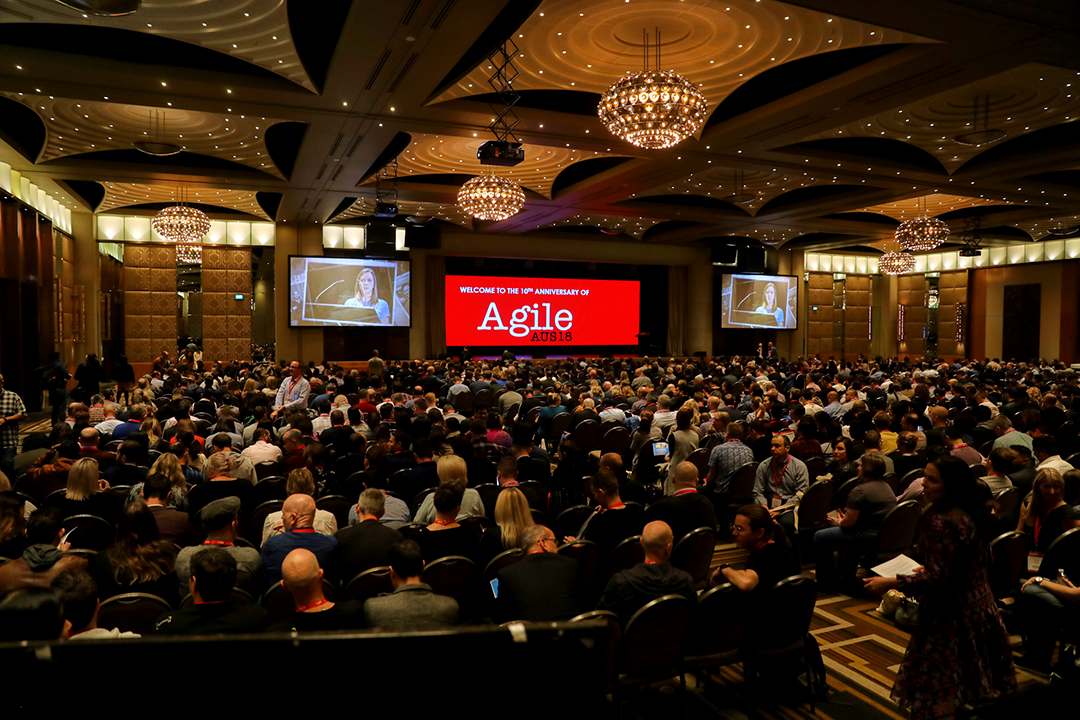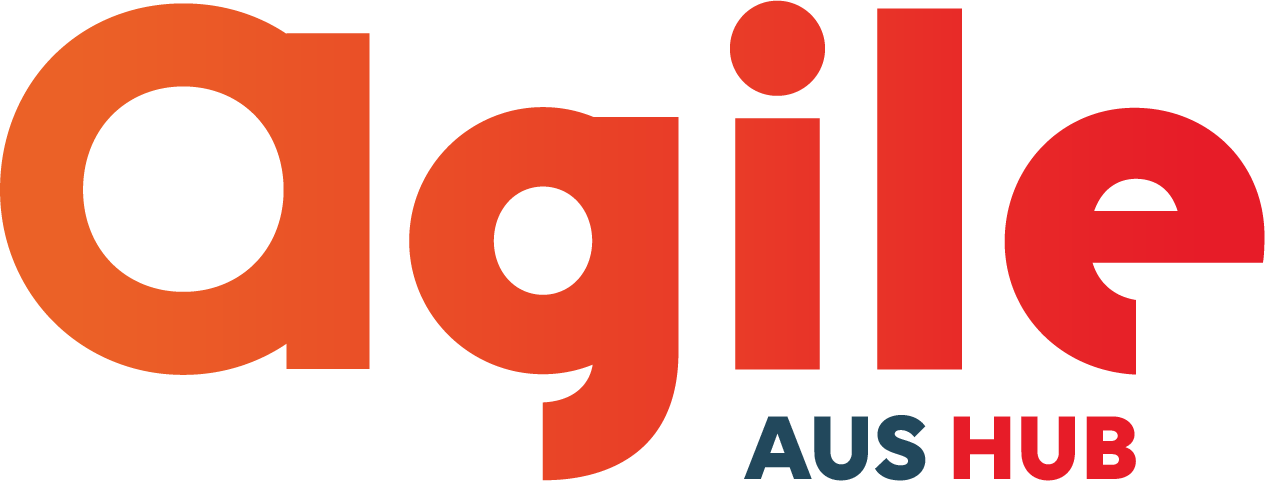
A Decade Doing It! Reflections on the Tenth Anniversary of the AgileAus Conference.
The tenth AgileAus18 was held on 18-19 June — thanks for making our anniversary one that we’ll never forget. Here, we take a look back at some of the highlights of this year’s Conference. Enjoy the trip down memory lane! And, for those who weren’t able to make it this year, we hope you’ll be able to join us at AgileAus19 on 25-26 June in Sydney.
A shared experience
Although it was the tenth time the team had run the Conference, AgileAus18 was an event of many firsts. On Day One of 2018’s AgileAus, we took community feedback into account and experimented with the concept of a ‘shared experience’. All 1200+ attendees gathered in a single-stream forum in Melbourne’s Crown Palladium to collectively witness a knockout lineup of local and international keynotes.
The day kicked off with a presentation from AgileAus09 keynote, Jeff Smith. Smith shared his views on building an Agile company, followed by ‘firestarter’ Simon Wardley who wowed delegates with his innovative approach to mapping.
By the light of the AgileAus18 hearth, Nigel Dalton led an intriguing conversation with Steve Denning on Strategic Agility. The fireside conversations continued to ignite discussion as ANZ CEO Shayne Elliott and broadcaster Sally Warhaft explored the challenges inherent in a large-scale Agile transformation. Elliott outlined the changes ANZ made to adopt a more Agile mindset: from overhauling their interview process to find candidates who would flourish under collaborative working conditions to learning to embrace the “theatre of Agile” (where standups and sticky notes take centre stage!).
Throughout the day, keynotes stretched our imaginations as they considered the future directions and applications of Agile. Jeff Gothelf provided a set of underlying principles critical to the success of Agile, Design Thinking, Lean or any other methodology, stressing the universal value of exercising radical transparency, working in short cycles and testing high-risk hypotheses. Josh Seiden outlined his philosophy of ‘sense and respond’, encouraging delegates to continuously learn from customer behaviour and adjust their strategies accordingly. Martin Fowler stirred the crowd with his perspectives on Agile in 2018. “People are at their best when they can choose how they work,” Fowler said — a message that surely resonated with most in the room.
Importantly, keynotes encouraged us to ask not what our Agile toolkit can do for us, but what we can do for the world using our Agile toolkit! Jirra Lulla Harvey of Kalinya Communications explored how Indigenous Australian values of stewardship, community and resilience can inform and improve contemporary leadership. Jessie Shternshus delivered a hands-on session focused on the importance of ‘unlearning’. Shternshus outlined how the progress of individuals, groups or organisations can so often be hindered by a failure to discard narrow and outdated ways of thinking, ultimately encouraging us to adopt a childlike embrace of play.
Aubrey Blanche spoke compellingly on data-informed HR for high-performing teams, proving the need for a real change in recruiting practices and office cultures in order for organisations to recruit and retain diverse teams.
We were delighted to welcome back President of the Food Bank For New York City, Margarette Purvis, who updated us on the progress made by the organisation’s Kaizen Food Bank. Since introducing Lean thinking into its operations, the Food Bank has significantly reduced the length of its queues. NYC’s hungry, thanks to this experiment in Lean thinking, no longer have to queue up in the face of brutal weather conditions and potential judgement from their neighbours just to get a meal. The work of Margarette and her team at the Food Bank For New York City is a testament to the power of innovative delivery to result in real, measurable social change. The response to her presentation made evident the strong appetite that exists within the Australian Agile community to put their technical skills towards social good.
Importantly, keynotes encouraged us to ask not what our Agile toolkit can do for us, but what we can do for the world using our Agile toolkit! Jirra Lulla Harvey of Kalinya Communications explored how Indigenous Australian values of stewardship, community and resilience can inform and improve contemporary leadership. Jessie Shternshus delivered a hands-on session focused on the importance of ‘unlearning’. Shternshus outlined how the progress of individuals, groups or organisations can so often be hindered by a failure to discard narrow and outdated ways of thinking, ultimately encouraging us to adopt a childlike embrace of play.
Aubrey Blanche spoke compellingly on data-informed HR for high-performing teams, proving the need for a real change in recruiting practices and office cultures in order for organisations to recruit and retain diverse teams.
We were delighted to welcome back President of the Food Bank For New York City, Margarette Purvis, who updated us on the progress made by the organisation’s Kaizen Food Bank. Since introducing Lean thinking into its operations, the Food Bank has significantly reduced the length of its queues. NYC’s hungry, thanks to this experiment in Lean thinking, no longer have to queue up in the face of brutal weather conditions and potential judgement from their neighbours just to get a meal. The work of Margarette and her team at the Food Bank For New York City is a testament to the power of innovative delivery to result in real, measurable social change. The response to her presentation made evident the strong appetite that exists within the Australian Agile community to put their technical skills towards social good.
The depth and breadth of the australian agile community
Day Two of AgileAus18 featured a host of speakers that truly represented the depth and breadth of Agile in Australia. Instead of inviting speakers through a submission system, as we had done in previous years, this year we trialled taking expressions of interest from the community.
The presentations were demonstrative of the diverse ways in which Agile is being used across the nation. From ensuring the Royal Australian Air Force can maintain a warfighting advantage in uncertain environments to facilitating the rapid rise of wardrobe startup THE ICONIC; Agile certainly appears to be powering the future of Australia!
Members of the Australian Agile community shared learnings and case studies from their own practices, giving delegates plenty to take back and apply within their workplace. Pat Reed presented a Business Agility playbook, positioning collaboration, having clear and visible priorities and nurturing a learning culture as factors critical to a successful organisational culture change. Peter Moran argued that Agile squads are dead, while Megan Dell made the case for fusing Agile and UX practices.
Adam Boas explored the usefulness of adopting ‘people over process’ as a blanket rule, Elise Aplin offered ‘Safe to Grow’ as an alternative mantra to ‘Safe to Fail’, and Tim Dunlop stretched minds as he pondered the future of work (could it be no work at all?!).
These were, of course, merely a few of the fantastic insights shared by the community on the second day of AgileAus18.
We’re so thankful to all presenters, volunteers, community members, delegates and sponsors who made this tenth anniversary so very special.

Stay in the loop
To receive updates about AgileAus and be subscribed to the mailing list, send us an email with your first name, last name and email address to signup@agileaustralia.com.au.

0 Comments